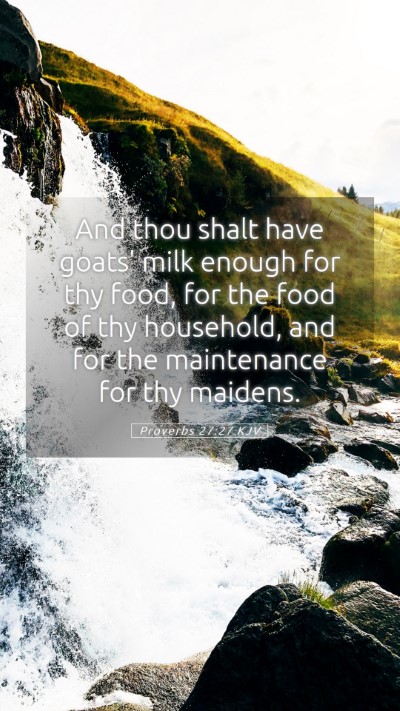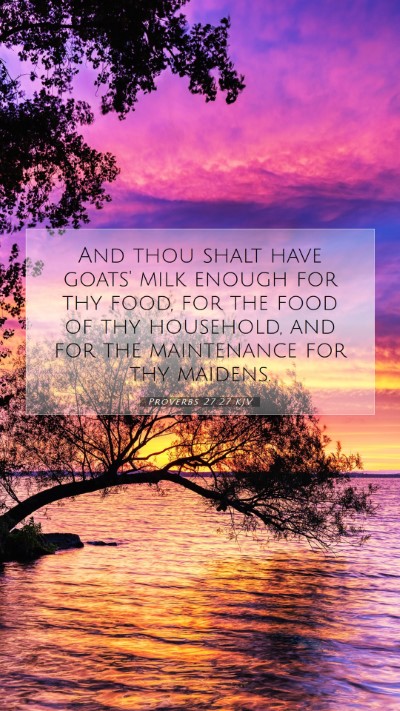Understanding Proverbs 27:27
The verse Proverbs 27:27 states, "And thou shalt have goats' milk enough for thy food, for the food of thy household, and for the maintenance for thy maidens." This verse emphasizes the abundant provision that comes from diligence and responsible management of one's resources. Below is a comprehensive analysis that draws insights from various public domain commentaries.
Contextual Background
Proverbs is a book of wise sayings that provides insights for managing life’s various aspects, including family, finances, and relationships. Proverbs 27 encourages readers to focus on prudence in their daily lives. The mention of goats' milk is symbolic of sustenance and abundance. Understanding this verse requires an appreciation of the agrarian culture in which it was written.
Verse Analysis and Commentary
In any Bible study group, the interpretation of this verse should start with the significance of each component of the verse. Here is a summary of insights pulled from prominent commentators:
-
Matthew Henry:
Matthew Henry reflects on the association of goats’ milk with prosperity and the well-being of a household. He interprets this provision as a sign of God’s blessing and emphasizes that when a person is diligent in their labor, they will reap sustenance for themselves and their family. This mirrors the Biblical principle found throughout Scripture that God rewards hard work.
-
Albert Barnes:
Albert Barnes expands on the types of provisions mentioned, noting that the goat is an important domestic animal in agricultural economies. He emphasizes that the milk signifies both immediate food sources and the potential for growth in one’s household resources. In essence, Proverbs 27:27 encapsulates the idea that proper care and management of resources lead to abundance.
-
Adam Clarke:
Adam Clarke discusses this verse in the context of household management. He notes that having enough milk for food indicates not just survival, but also the ability to sustain a household comfortably. Clarke also touches upon the implications of having maidens (possibly young women in service) underscoring that a responsible leader is one who ensures the well-being of all members of their household.
Thematic Insights
Several themes emerge from Proverbs 27:27:
- Provision: This verse highlights the assurance of provision for one’s family when industrious work is applied.
- Responsibility: The verse calls attention to the necessity of managing one’s resources wisely to ensure the needs of all household members are met.
- Abundance: The abundance symbolized by goats’ milk implies that with diligence and faithfulness, one will experience plenty.
Application to Daily Life
To apply Proverbs 27:27 in contemporary settings, one might consider how the principle of diligent stewardship plays out in modern life:
- Evaluating personal or family resources to ensure all basic needs are met.
- Emphasizing hard work and responsibility in both professional and personal settings.
- Recognizing the blessings that come from being diligent, which can extend beyond the material to spiritual and relational abundance.
Practical Takeaways
When studying Scripture, especially passages like Proverbs 27:27, consider the following practical takeaways:
- Work diligently in your vocation or calling, and trust in God for provision.
- Be mindful of the needs of your household and practice responsible management.
- Recognize that God abundantly provides for those who trust Him and work diligently.
Relevant Cross References
In further study, you may consider the following cross references, which enhance the understanding of this verse's themes:
- Proverbs 10:4: "He becomes poor that deals with a slack hand: but the hand of the diligent makes rich."
- Proverbs 21:20: "There is treasure to be desired and oil in the dwelling of the wise; but a foolish man spends it up."
- 2 Corinthians 9:6: "But this I say, He which sows sparingly shall reap also sparingly; and he which sows bountifully shall reap also bountifully."
Conclusion
Proverbs 27:27 serves as a powerful reminder of the importance of diligence, responsibility, and reliance on God for provision. It encourages believers to engage actively in their lives and trust that God supplies for their needs. As you delve deeper into the meanings of this verse, consider how its principles apply to your life and community, fostering an environment of abundance and stewardship.


